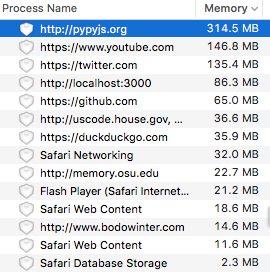There's been a lot of talk recently about using Javascript as the assembly language of the web, and tools like ASM.js allow developers to write code in any language they want and compile it, instead of to a native binary, into a subset of Javascript that can be run very efficiently in the browser. In fact, in testing Mozilla and Unreal were able to cross compile a few modern video games in to Javascript from C and the games played at half native speed! Frankly, that's amazing.
The Benefits of PyPy.js and ASM.js
If you've ever seen Gary Bernhart's talk, The Birth and Death of Javascript then you've seen this kind of thing before. One really cool project involving ASM.js is PyPy.js by Ryan Kelly which aims to be a fully compliant PyPy implementation running in the browser. One of the big issues with compiling a language to Javascript has always been how to make it fast, but during his PyCon 2015 talk Ryan demonstrated that although the PyPy.js version was indeed 10x slower than the native PyPy interpreter, it was over 1.2x faster than the native CPython interpreter which is the version of Python that most of us are actually using. While that may be a testament to just how good the PyPy interpreter and JIT compiler are, it does have some interesting implications for Python on the web.
<script type="text/python" src="main.py"></script>
Ryan has gone on to say that, in his opinion, one of the major issues with using his PyPy.js in real world cases is that in order to begin running your code in Python on the web, each page has to download the PyPy.js interpreter, and it's not a small download. Currently, he says that the interpreter weighs in around 5MB when compressed. Once it's loaded however, the browser can cache the interpreter locally and avoid that cost in the future. To me, initial startup time is not really the big issue though, and while it's true that 5MB is a crazy big file to be transmitting over the web, most sites already force users to download that much data in ad tracking code alone.
What's the problem then?

In my mind, the issues facing developers using this new toolchain are not initial file downloads or startup time costs. These are one-time costs if developers leverage the new HTML 5 caching APIs like AppCaching and LocalStorage. Users are already accustomed to "Installing" software and moving that process to the web is something I'm confident designers and developers can do well. My concern has far more to do with runtime performance, specifically memory usage. In a world where most sites running lots of Javascript already use hundreds of megabytes, full ports of the PyPy interpreter on top of fully fledged applications are just going to make performance worse.
Web applications are immense resource hogs. What typically takes kilobytes of memory in a native application takes megabytes on the web. Frankly, that kind of usage is pretty unacceptable as is, and bolting an interpreter on top of that will only make the problem worse.
X, my window
manager (dwm), terminal (xterm), shells (zsh), etc. add up to about 80 MB of
RAM. Chrome is using 4 GB of RAM. 50 times more.
— Gary Bernhardt
(@garybernhardt) November 11,
2015What's the solution?
Looking at the history of programming languages and performance, you could make the argument that this is just the next step. You could, for example, argue that the jump from native code to interpreted languages like Python had a similar cost in speed and performance, and I'd grant you that point. It certainly could be that the web is the single most important and viable development platform and that the performance costs will be worth it.
The jump to using the web as the virtual machine in which we run the software of tomorrow should be one we take with caution. The speed penalties aren't large, and I'm happy that that's true, but with most desktop users still having less than 6GB of memory and mobile users teetering around a third of that, developers will have to be careful not to try too much at once. Games can allocate gigabytes of memory and get away with it, but when a user's entire application suite is in the cloud, memory will be, as it almost always has been, a precious resource.
